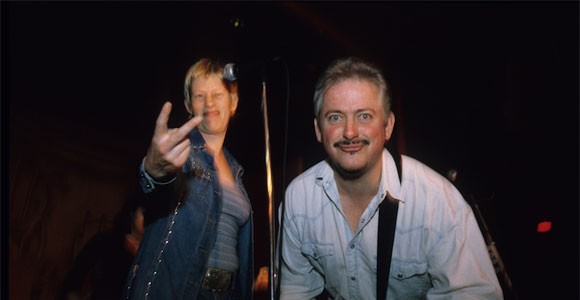
From Simon Reynolds’ sprawling L.A. Review of Books interview (Pt. 1 + Pt. 2 + Pt. 3 + Pt. 4) with Greil Marcus, an exchange about how the legendary rock journalist came to sever ties with Rolling Stone:
“SR: But you left Rolling Stone after only a few years as the reviews editor, right? How come?
GM: It was a complicated situation. Originally Jann formed an editorial board to decide everything: hiring and firing, themes, the future. It was Ralph Gleason and John Burks, who was the managing editor, and Jann and me. We met every couple of weeks, maybe weekly. Usually at my house. And after the third or fourth meeting my wife said to me, ‘How long do you think Jann is really going to want to keep you people around just to tell him how he’s doing everything wrong?’ Which is what we were doing, pretty much! I thought, ‘Oh, he values our opinion.’ In the spring of 1970, when the Kent State shootings took place, and the shootings in Jackson State, which have been completely forgotten but were a big deal then, campuses across the country erupted and higher education in the U.S. was brought to pretty much a standstill. And Nixon goes on to the Lincoln Memorial in the middle of the night to talk to protesters and he’s drunk. So people are, like, ‘What’s going on here?’ Jann was out of town, so John Burks and I put together a really fabulous issue, called ‘The Pitiful Helpless Giant’ — those were Nixon’s words about the USA; he was saying the U.S. was not going to become a pitiful helpless giant. When Jann got back, I think he found that the paper — we didn’t call it a magazine then — was being taken away from him. It wasn’t that he did or didn’t like what we had done, but what we had done was something major: a firm and strong political stand just through what we’d published. The paper was slipping away from him. He was losing his moral authority by having ceded so much of it to other people.
When I became record reviews editor, I made it clear to him after a few months — nobody had done the job before me — that the record review section was an independent republic within the country of Rolling Stone. That meant that nobody else could tell me what to review or what a writer could say. They could argue with me, but ultimately it was my decision. And that worked well. There was one incident where Paul McCartney makes his first solo record and people thought it was wonderful: this rough, homemade one-man-band album. It was accompanied by a press release, a self-interview, about why he no longer needed the Beatles and how little he thought of them … this real obnoxious statement, you know? I assigned it to a friend of mine, Langdon Winner, and Jann saw the piece and said: ‘We can’t run it this way — he’s just reviewing it as if it’s this nice little record. It’s not just a nice little record, it’s a statement and it’s taking place in a context that we know: it’s one person breaking up the band. This is what needs to be talked about.’ I said I didn’t agree and “in any case it’s up to Langdon to say what he wants to say.’ Jann said, “We have to talk about this.” So we went to dinner that night and spent three fucking hours arguing about this record review. Finally he convinced me. So I went over to Langdon’s and sat down with him and spent three more hours arguing with him until I convinced him! Now to me this was the essence of great editing, of how you put out a publication that is utterly honest. All that time spent over one 750 word review! And it was worth it.
But Jann had to take the paper back, he really did. He called me in … June 1970, I guess, and said, ‘I really want to talk about what you’re going to be doing here.’ It was all ‘do this’ and “do that” and ‘you’re not doing that.’ I came away from this long conversation really feeling great: it was a new role at the magazine, with more freedom. I came home and told my wife about it in great detail. And Jenny said, ‘Greil, you’ve just been fired.’ I said, ‘I have?!?’ And she explained to me what this conversation had really been about. Now to this day, Jann will probably say that I quit, and I will say I was fired. But it was that subtle. It was pretty slick.”




